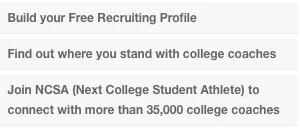NCAA Issues Interps on Sports Psychology, Summer Activities and Foreign Tours
Last Thursday the NCAA issued three interpretations of Division I rules on three different topics. None of them are that ground breaking but are more than technical changes.
First, on meetings with a sports psychologist:
The academic and membership affairs staff determined that an institution may require a student-athlete to meet with a sports psychologist as a permissible out-of-season conditioning activity, provided the time engaged in the sessions are included in the maximum limit of eight hours per week for countable athletically related activities outside the playing season.
In addition, in bowl subdivision football, the sports psychologist would not have to count as one of the five strength and conditioning coaches permitted to work with the football program in any capacity.
This interp classifies sports psychology as a conditioning activity. But oddly enough, a sport psychologist is not considered a strength and conditioning coach. It seems like it should be one or the other: either sports psychology is skill instruction or sports psychologists are strength and conditioning coaches. But sports psychology has always had a favored position in NCAA rules, so the fact it gets the benefits of both worlds is not surprising.
The next interp involves graduate transfer students participating in summer activities:
The academic and membership affairs staff determined that an incoming four-year transfer student-athlete may participate in summer athletic activities without being enrolled in summer school prior to initial full-time enrollment at the certifying institution, provided:
(a) The individual has graduated from his or her previous institution;
(b) The individual has been accepted for enrollment as a graduate student at the certifying institution; and
(c) The individual has signed the certifying institution’s written offer of admission and/or financial aid or the institution has received the individual’s financial deposit in response to the institution’s offer of admission.
This is completely logical since the academic exception to the enrollment requirement for summer practice is based on being closer to graduation than required by basic NCAA eligibility requirements. Having actually graduated is consistent with that. But in practice the enrollment exceptions will rarely be used, especially at power conference programs, since athletes who are not enrolled in summer school cannot get financial aid or expenses to attend the required practices. So athletes will generally be enrolled in summer school regardless of whether they are required to.
The final interp covers eligibility to go on a foreign tour:
The academic and membership affairs staff determined that a student-athlete who is eligible for any term during the previous academic year at the certifying institution would be eligible to compete in the institution’s foreign tour taken during the summer immediately following that same academic year. For example, if a student-athlete is eligible in the fall term at the certifying institution, but not eligible in the spring term of the same academic year, the student-athlete would be eligible to compete in the institution’s summer foreign tour taken during the summer after the conclusion of the preceding academic year.
As a matter of law, this is correct. Here is relevant portion of the bylaw being interpreted:
If the tour takes place during the summer, the student-athletes shall have been eligible for intercollegiate competition during the previous academic year or shall have been enrolled at the institution as a full-time student during the previous academic year and have established by the beginning of the tour that he or she is eligible for competition during the academic year immediately following the tour
The bylaw says nothing about for how long athletes needed to be eligible. With this interp, an athlete ineligible for competition during the spring term does not have to establish eligibility for the following fall term. The only athletes who have to do that are those who were ineligible for the entire preceding academic year.
As a matter of policy, athletes should be required to be eligible for competition at the time of the tour. So for a summer tour, athletes should have to either have been eligible for competition during the spring term of the preceding academic year or have established eligibility for the fall term of following academic year.
Arkansas Baptist College Sports Recruiting


